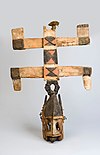
Back Bori Czech Bori (Hausa) German Bori Spanish Animisme haoussa French Maguzanci HA Bori (religião) Portuguese Hausareligion Swedish Hausa animizmi Turkish
| Part of a series on |
| Traditional African religions |
|---|
 |


Hausa animism, Maguzanci or Bori is a pre-Islamic traditional religion of the Hausa people of West Africa that involves magic and spirit possession. While only a part of the Hausa people (mostly within urban elites) converted to Islam before the end of the 18th century, most of the adherents of the religion did the same between the jihad started by the Islamic reformer Usman dan Fodio around 1800 and the middle of the 20th century, while a small minority converted to Christianity.[citation needed] Religious affiliation to this traditional religion is virtually nonexistent at the beginning of the 21st century; however, Hausa animism and Islam among Hausa people have coexisted for centuries, and some practices related to animism carry on locally.
When discussing "bori", there is a distinction to be made between the beliefs of the Manguzawa (which consist of pagan or heavily pagan influenced Hausa religion), the general belief in spirits and animism that persists even among Muslim Hausa, and the possession-trance group that puts on dance performances and ceremonies.[1]
- ^ Besmer, Fremont. Horses, musicians, and gods: the Hausa cult of possession-trance.